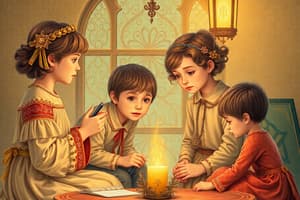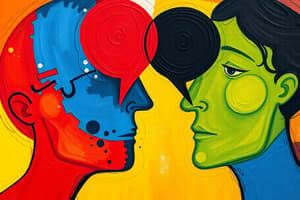Podcast
Questions and Answers
Match the social emotional skills with their descriptions:
Match the social emotional skills with their descriptions:
Developing Self-Esteem = Is the process of successfully adapting in the face of negative situations Social Skills = Try to understand different perspectives and learn to listen with empathy Problem-Solving Skills = Do something good for others and take pride in your opinions Developing Psychological Resilience = Exercise, relax, and have fun
Match the social emotional skills with their strategies:
Match the social emotional skills with their strategies:
Social Skills = Learn to read facial expressions and use the 'I' message Developing Self-Esteem = Set goals and aim for effort rather than perfection Problem-Solving Skills = Brainstorm possible solutions and evaluate the pros and cons Developing Psychological Resilience = Accept compliments and give yourself credit
Match the social emotional skills with their benefits:
Match the social emotional skills with their benefits:
Social Skills = Ability to 'stand-up' after every stumble Developing Self-Esteem = Ability to understand different perspectives Problem-Solving Skills = Increased confidence in opinions and ideas Developing Psychological Resilience = Ability to adapt to negative situations
Match the social emotional skills with their influences:
Match the social emotional skills with their influences:
Match the social emotional skills with their characteristics:
Match the social emotional skills with their characteristics:
Match the social emotional skills with their outcomes:
Match the social emotional skills with their outcomes:
Match the following components of psychological well-being with their corresponding descriptions:
Match the following components of psychological well-being with their corresponding descriptions:
Match the following developmental needs in childhood and adolescence with their corresponding descriptions:
Match the following developmental needs in childhood and adolescence with their corresponding descriptions:
Match the following aspects of mental health in childhood and adolescence with their corresponding descriptions:
Match the following aspects of mental health in childhood and adolescence with their corresponding descriptions:
Match the following components of Seligman's PERMA with their corresponding descriptions:
Match the following components of Seligman's PERMA with their corresponding descriptions:
Match the following developmental needs in childhood and adolescence with their corresponding descriptions:
Match the following developmental needs in childhood and adolescence with their corresponding descriptions:
Match the following components of mental health in childhood and adolescence with their corresponding descriptions:
Match the following components of mental health in childhood and adolescence with their corresponding descriptions:
Match the following social emotional skills with their descriptions:
Match the following social emotional skills with their descriptions:
Match the following signs of mental distress with their corresponding domains:
Match the following signs of mental distress with their corresponding domains:
Match the following sources of support for mental health with their descriptions:
Match the following sources of support for mental health with their descriptions:
Match the following mental health concerns in adolescence with their descriptions:
Match the following mental health concerns in adolescence with their descriptions:
Match the following signs of mental distress with their corresponding domains:
Match the following signs of mental distress with their corresponding domains:
Match the following social emotional skills with their descriptions:
Match the following social emotional skills with their descriptions:
Flashcards are hidden until you start studying




